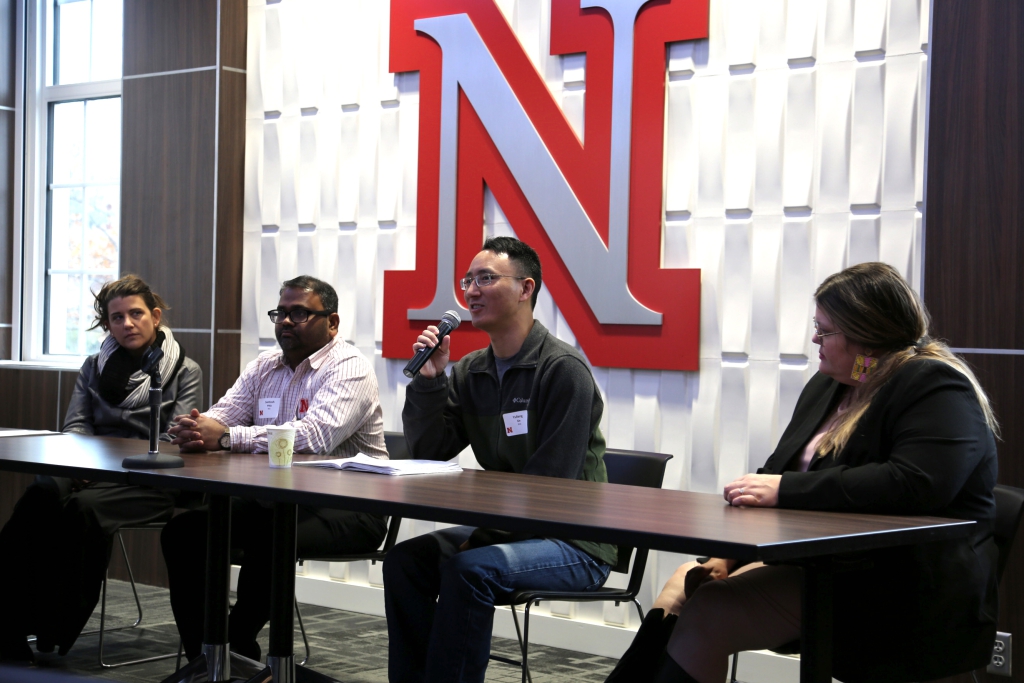Tiffany Lee, December 2, 2022
Grand Challenges awardees share their tips for success
Researchers looking for secrets to success in the University of Nebraska-Lincoln’s Grand Challenges Catalyst Competition got an earful of helpful advice during a Nov. 14 discussion panel featuring four Husker faculty from three winning teams in the contest’s first cycle.
The panel, part of the Office of Research and Economic Development’s Nebraska Research Days event, included Katie Edwards, associate professor of educational psychology; Liz Lorang, associate professor of University Libraries; and Santosh Pitla and Yufeng Ge, associate professors of biological systems engineering. They spoke about the strategies and mindsets that helped them succeed in the competition, which is part of the university’s $40 million commitment to fund work that directly connects to Nebraska’s Grand Challenges initiative.
The discussion spanned a wide range of topics, including top tips for Grand Challenges proposers, teaming and project scope. Many of the panelists spoke about balancing “grandness” with feasibility, which requires a project that is both highly imaginative and clear about short-, medium- and long-term goals.
“When you’re dreaming big and being grand, be sure that you’re actually going to be able to do it – and be sure to clarify why your team is the one to do it,” said Edwards, whose team received a $3,210,177 catalyst grant to establish and evaluate an indigenous-led center dedicated to preventing sexual violence among indigenous youth.
“Also, from day one of writing, think about the sustainability piece – how are we going to be able to sustain this beyond the grant period?”
Pitla encouraged applicants to assess the lay of the land surrounding their research area, including how the university’s strengths intersect with gaps in the research field. He used he and Ge’s project, which aims to eventually grow corn on Mars, as an example.
“It may be helpful to think about our university’s strengths. What are we really good at, here at Nebraska? What are the biggest areas that we are not playing in yet?” he said. “For example, we’re good in agriculture, but we’re not there on the space front yet – and there are no centers on space agriculture in the U.S. yet.”
To focus a Grand Challenges proposal, Lorang suggested strategies for framing a project.
“My top tip is to be able to frame your project as a question, and to make it a very bold question,” she said. “One of the most exciting things about Grand Challenges is that it is so aspirational. We started with questions – not with what we want to do or where we want it to go.”
The panelists also discussed best practices for forming large, interdisciplinary teams. They all started by leveraging existing networks and partnerships. Then, to reach new potential collaborators from other disciplines, they took advantage of ORED’s faculty networking events and made other concerted efforts to reach out.
Ge noted that building a strong team requires an investment of time dedicated to expanding one’s circle and becoming familiar with others’ work.
“Expand your own research network and spend time learning what your colleagues are doing,” he said. “Who can help you make your work more complete? True innovation comes from an interdisciplinary view of the same thing, the same question.”
Edwards noted that cold calls are sometimes necessary to initiating collaboration, especially when trying to incorporate a new element into the project – like an arts and humanities component, which is required in Grand Challenges proposals.
The panelists underscored that the program provides a unique avenue for pushing beyond the day-to-day work of a research program and securing funding for a project that is too big or broad to receive funding from a more traditional source.
“For me, this was the culmination of my entire life’s work,” Edwards said. “It sounds cheesy, but if you have a really good idea and you put the passion and time into it, it’s an amazing opportunity to achieve something you may not be able to get funded right away through other agencies.”
The 2023 request for proposals is due Feb. 28, 2023. For a full list of current awardees, visit the Grand Challenges website.






